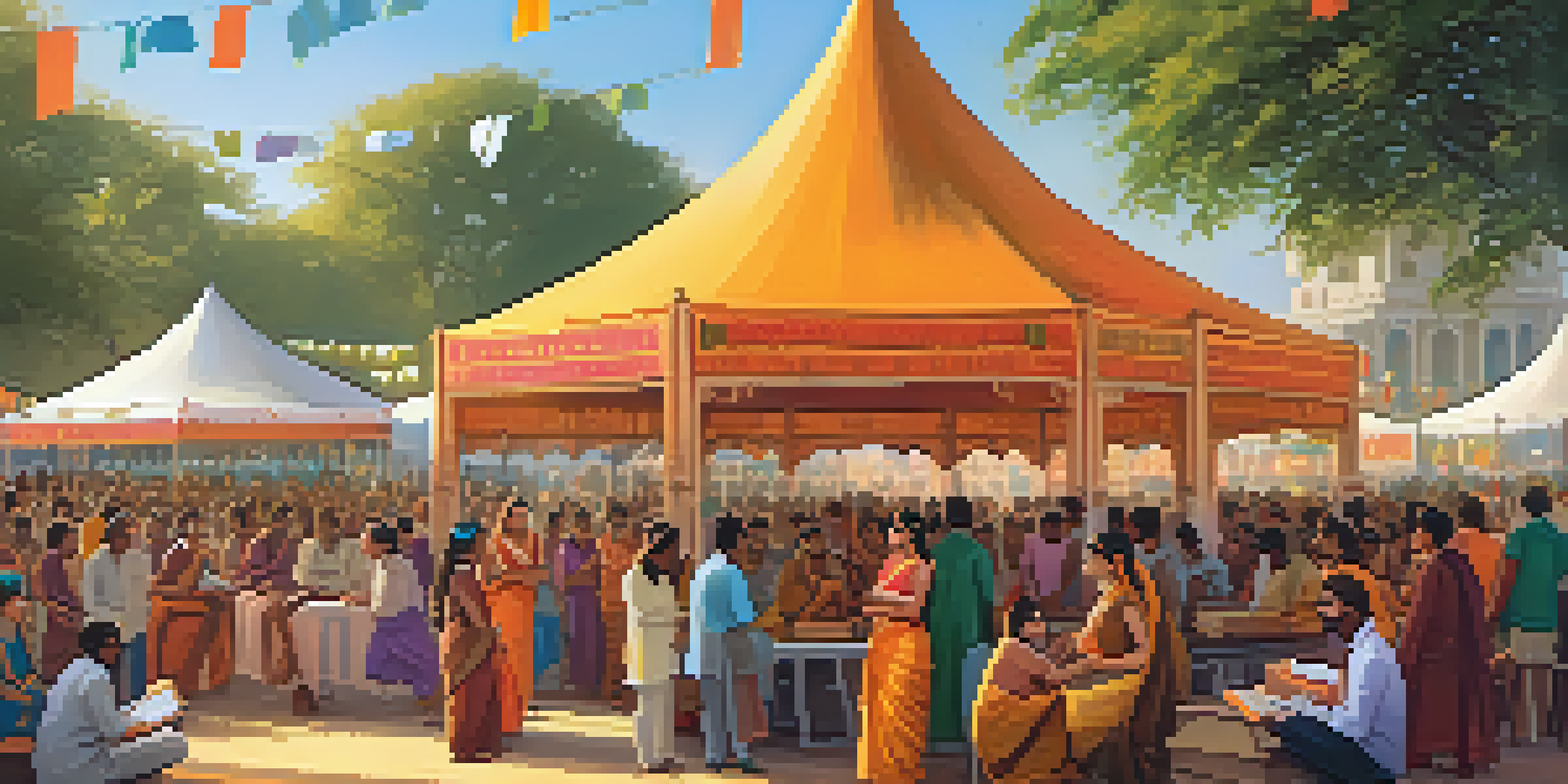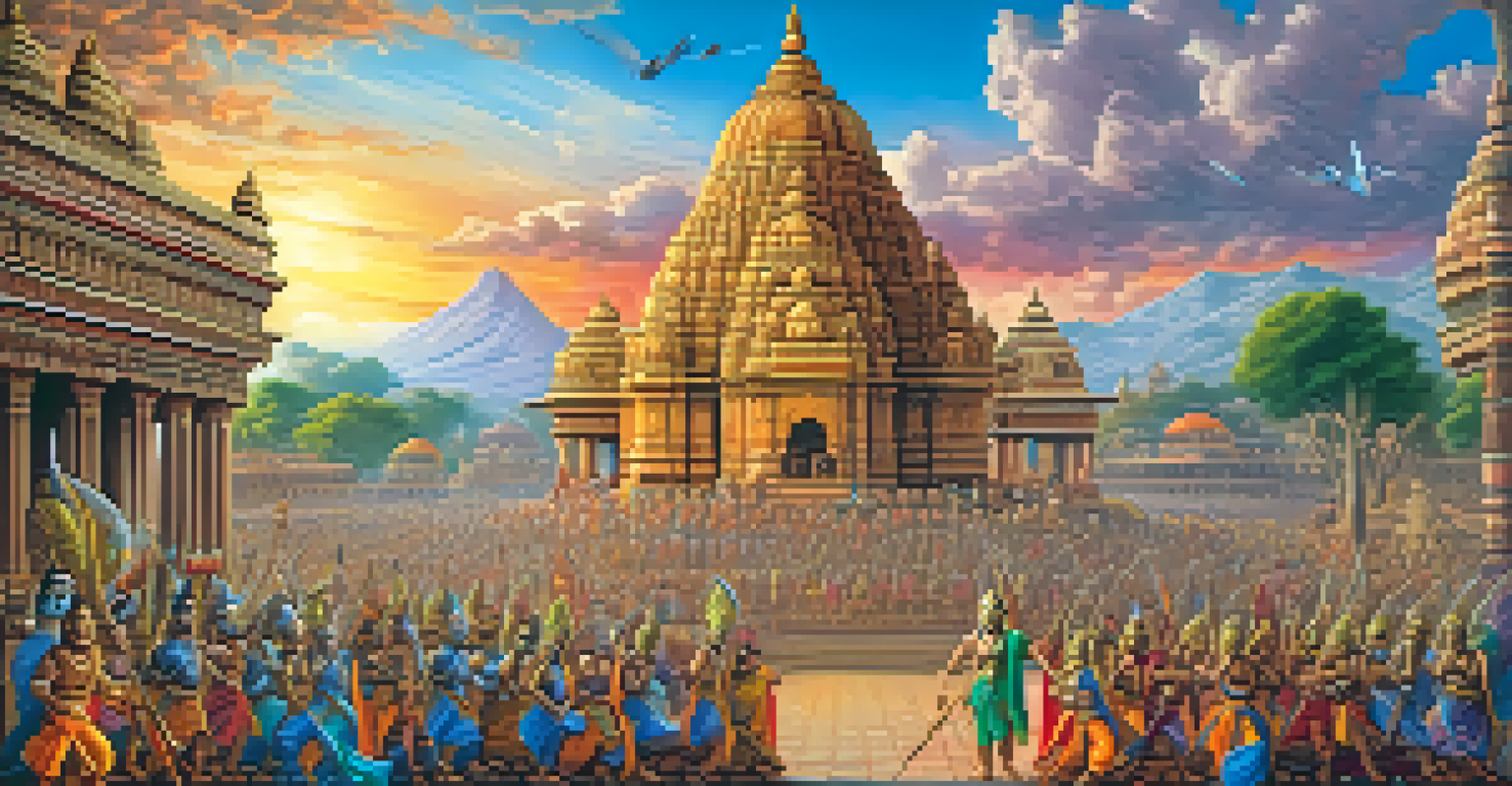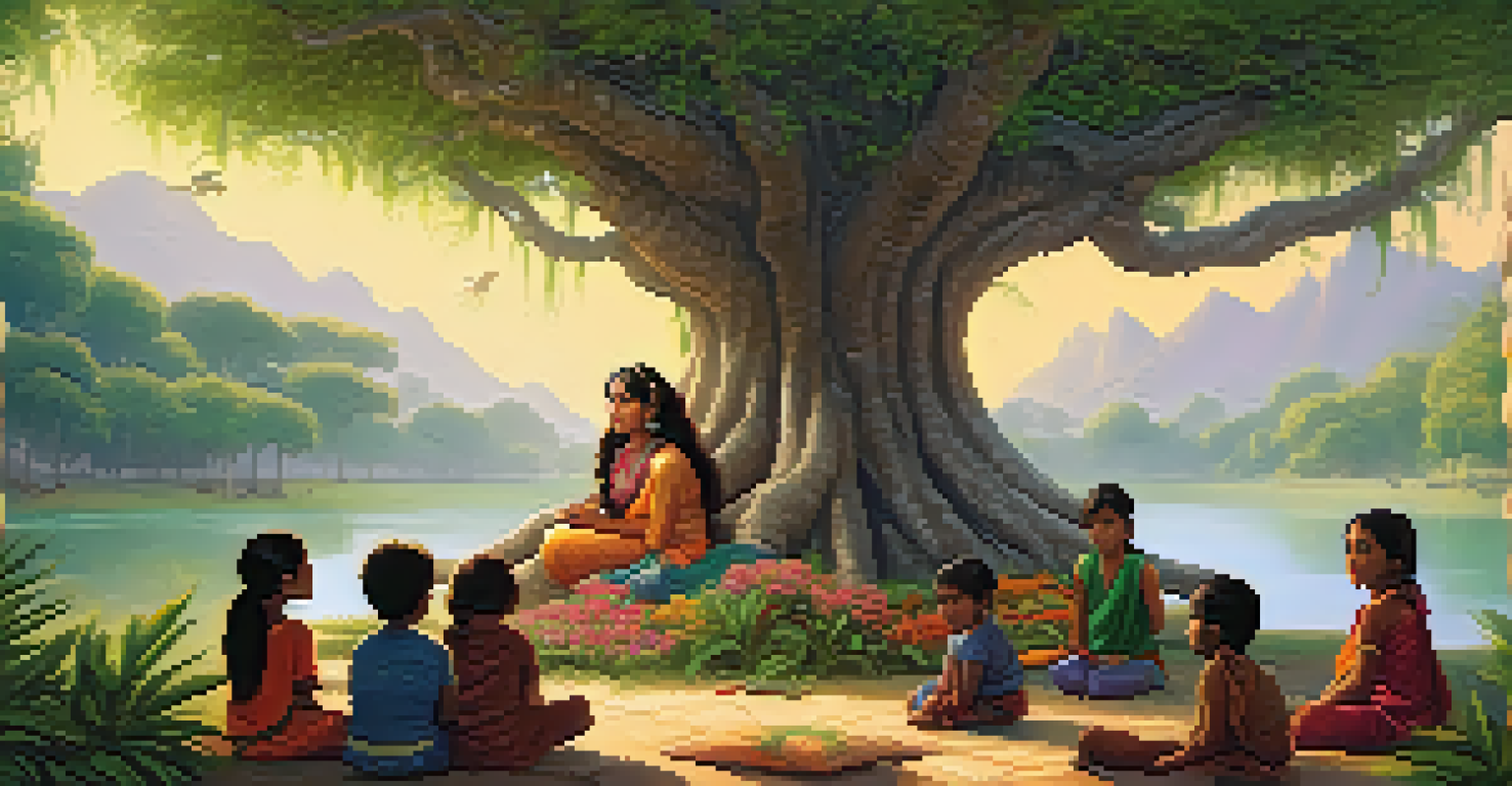The Role of Literature in Shaping India's Cultural Heritage

Literature as a Mirror of Indian Society and Culture
Literature serves as a reflection of the society it originates from, and in India, this is particularly true. Through novels, poems, and plays, writers capture the essence of various cultures, traditions, and social issues. For instance, the works of Rabindranath Tagore delve into the complexities of human emotion while addressing societal norms, showcasing the intermingling of personal and cultural narratives.
Literature is the most agreeable way of ignoring life.
Moreover, literature often documents historical events and cultural shifts, providing future generations insight into the past. The epic tales of the Mahabharata and Ramayana not only entertain but also impart moral lessons and cultural values that resonate with Indian life. By engaging with these texts, readers can better understand the evolution of Indian society and its multifaceted identity.
Ultimately, literature in India acts as a bridge, connecting different communities and fostering a sense of shared identity. Whether it’s through regional dialects or universal themes, the stories told by Indian authors promote dialogue and understanding, reinforcing the idea that literature is an integral part of cultural heritage.
Regional Literature and Its Significance
India is home to a wealth of regional literatures, each with its unique voice and flavor. From the poignant poetry of Urdu to the vibrant narratives in Bengali, these regional literatures celebrate diversity while addressing local issues. For instance, writers like Ismat Chughtai have used their works to challenge societal norms and highlight the struggles faced by women in their communities.

Regional literature not only preserves local dialects and traditions but also allows for a deeper exploration of identity. Through stories rooted in specific locales, readers gain insight into the customs, beliefs, and challenges of various communities. This fosters appreciation and respect for cultural differences, which is vital for a nation as diverse as India.
Literature Reflects Indian Society
Indian literature captures the essence of diverse cultures and societal issues, acting as a mirror to the complexities of life in India.
Furthermore, the resurgence of interest in regional literature has led to translations and adaptations, making these works accessible to a broader audience. This cross-pollination of ideas and styles enriches the overall literary landscape of India, proving that regional voices are critical to the nation’s cultural heritage.
The Role of Folklore in Indian Literature
Folklore plays a pivotal role in shaping Indian literature by preserving age-old traditions and oral histories. Stories passed down through generations often carry moral lessons, cultural practices, and historical accounts, offering a glimpse into the values of different communities. These tales, whether they feature clever animals or heroic figures, resonate with readers of all ages, bridging the gap between the past and the present.
Books are the mirrors of the soul.
Additionally, folklore has influenced many contemporary writers, who weave traditional stories into modern narratives. For instance, Salman Rushdie’s use of magical realism often draws on Indian folklore, creating a rich tapestry that reflects both cultural heritage and contemporary realities. This blend not only entertains but also invites readers to re-examine their roots.
Ultimately, the integration of folklore into literature ensures that these stories continue to thrive, reminding us of our shared heritage. By celebrating and preserving folklore, writers contribute to a larger cultural narrative that honors the wisdom of ancestors while engaging new audiences.
Literature and National Identity in India
Literature has played a crucial role in shaping the concept of national identity in India, particularly during the freedom struggle. Writers like Bhagat Singh and Sarojini Naidu used their words as powerful tools to inspire change and unify people against colonial rule. Their works instilled a sense of pride and purpose, showcasing how literature can fuel movements and foster national consciousness.
As India gained independence, literature continued to shape the national identity by exploring themes of unity and diversity. Authors like Kamala Das and R. K. Narayan addressed the complexities of modern Indian life, reflecting the tensions and triumphs of a newly independent nation. Through their storytelling, they articulated a collective identity that embraced both tradition and modernity.
Regional Voices Enrich Identity
Regional literature celebrates local traditions and dialects, promoting appreciation and understanding of India's cultural diversity.
In today's globalized world, literature remains a vital component of India's national identity. Contemporary authors tackle issues such as globalization, migration, and social justice, ensuring that literature continues to evolve alongside society. This ongoing dialogue between literature and national identity highlights the importance of storytelling in understanding who we are as a nation.
The Influence of Indian Literature on Global Culture
Indian literature has transcended borders, influencing global culture in significant ways. Works by authors like Arundhati Roy and Jhumpa Lahiri have garnered international acclaim, bringing Indian stories to a wider audience. Their narratives often explore themes of diaspora, identity, and the human experience, resonating with readers from different backgrounds.
Furthermore, the translation of Indian literary works into various languages has facilitated cross-cultural exchange. This accessibility allows global readers to appreciate the rich tapestry of Indian culture, from epic poetry to contemporary fiction. As these stories circulate worldwide, they contribute to a greater understanding of India's complexities and nuances.
In essence, the global impact of Indian literature underscores its universal appeal. By sharing experiences and perspectives through storytelling, Indian authors enrich the global literary landscape, fostering empathy and connection among diverse cultures.
Literature as a Tool for Social Change
Literature has long served as a catalyst for social change in India, addressing pressing issues such as caste discrimination, gender inequality, and environmental degradation. Novels and essays often shed light on injustices, prompting readers to reflect on the status quo and consider alternative perspectives. For example, the works of writers like Arundhati Roy challenge readers to confront uncomfortable truths about society.
Moreover, literature provides a platform for marginalized voices, empowering individuals to share their stories. Through autobiographies and fiction, writers from various backgrounds articulate their experiences and advocate for change. This inclusivity not only enriches the literary landscape but also fosters a sense of community and collective action.
Literature Drives Social Change
Through storytelling, literature raises awareness of social issues and empowers marginalized voices, inspiring collective action for change.
By raising awareness and encouraging dialogue, literature plays a crucial role in shaping public discourse and inspiring activism. The ability of stories to evoke empathy and understanding is a powerful tool, reminding us that literature can ignite change and challenge societal norms.
Preserving Cultural Heritage through Literature
As India continues to evolve, preserving cultural heritage through literature becomes increasingly important. Writers and scholars are dedicated to documenting traditional practices, oral histories, and unique customs that might otherwise fade into obscurity. These efforts ensure that future generations have access to their cultural roots, fostering a sense of belonging and pride.
Literature festivals and initiatives focused on reviving classical texts also play a significant role in preserving cultural heritage. Events like the Jaipur Literature Festival celebrate diverse voices and encourage discussions around cultural preservation, making literature a living, breathing entity. This engagement not only honors the past but also inspires contemporary writers to explore their heritage.

In conclusion, literature serves as a vital conduit for preserving India’s rich cultural tapestry. By celebrating and documenting the stories of the past, writers contribute to a legacy that future generations can cherish and learn from, ensuring that cultural heritage remains vibrant and relevant.